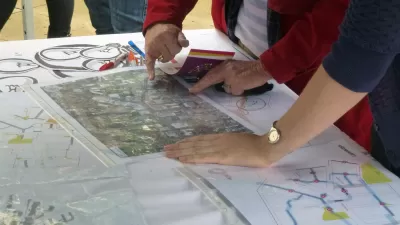For planners, the key to moving a city’s vision for development forward is to value public as well as private investment in projects, according to urban planner and author Howard M. Blackson III.

The road to new development is one fraught with obstacles for planners seeking to make changes to the landscape of the communities they serve, but finding new, updated planning practices could help carry the profession forward.
Howard M. Blackson III, urban planner and author, discusses what cities need to do to move ahead with development at a time when public trust is low.
“We have all experienced the difficulties with building new developments in Southern California. It is either too difficult to build something great or too easy to build something terrible. Most city planning departments have to overcome a past of allowing for deplorable new buildings that challenged the character of beloved older communities.”
A city’s planning staff faces public opposition to projects, specifically private-owner-driven ones, largely because of misconceptions about the duties of planning staff, according to Blackson.
“Most folks do not understand that private landowners have the right to make a proposal and that city planning staff must respond and process it. Add in the city’s convoluted planning processes, and too many folks end up not trusting any planning efforts, projects, and proposals. Opposing new projects is now sport, with cheerleaders, players, and scorecards.”
What has been lost in planning is the ability to match short-term private development proposals with long-term public efforts to reach a city’s goals and shape its policy, Blackson writes.
“The great recession revealed how many cities dismissed the value and role of planning in generating economic development. They formed blue ribbon committees to cut red tape and scale back policies, regulations, and staff, deemed to be in the way of new investment. While these cities held private investment in a higher regard than public investment, good city planning practices teaches that both are necessary for a city to thrive.
FULL STORY: The Value of Planning in the Age of Economics

Planetizen Federal Action Tracker
A weekly monitor of how Trump’s orders and actions are impacting planners and planning in America.

Maui's Vacation Rental Debate Turns Ugly
Verbal attacks, misinformation campaigns and fistfights plague a high-stakes debate to convert thousands of vacation rentals into long-term housing.

Restaurant Patios Were a Pandemic Win — Why Were They so Hard to Keep?
Social distancing requirements and changes in travel patterns prompted cities to pilot new uses for street and sidewalk space. Then it got complicated.

In California Battle of Housing vs. Environment, Housing Just Won
A new state law significantly limits the power of CEQA, an environmental review law that served as a powerful tool for blocking new development.

Boulder Eliminates Parking Minimums Citywide
Officials estimate the cost of building a single underground parking space at up to $100,000.

Orange County, Florida Adopts Largest US “Sprawl Repair” Code
The ‘Orange Code’ seeks to rectify decades of sprawl-inducing, car-oriented development.
Urban Design for Planners 1: Software Tools
This six-course series explores essential urban design concepts using open source software and equips planners with the tools they need to participate fully in the urban design process.
Planning for Universal Design
Learn the tools for implementing Universal Design in planning regulations.
Heyer Gruel & Associates PA
JM Goldson LLC
Custer County Colorado
City of Camden Redevelopment Agency
City of Astoria
Transportation Research & Education Center (TREC) at Portland State University
Jefferson Parish Government
Camden Redevelopment Agency
City of Claremont



























